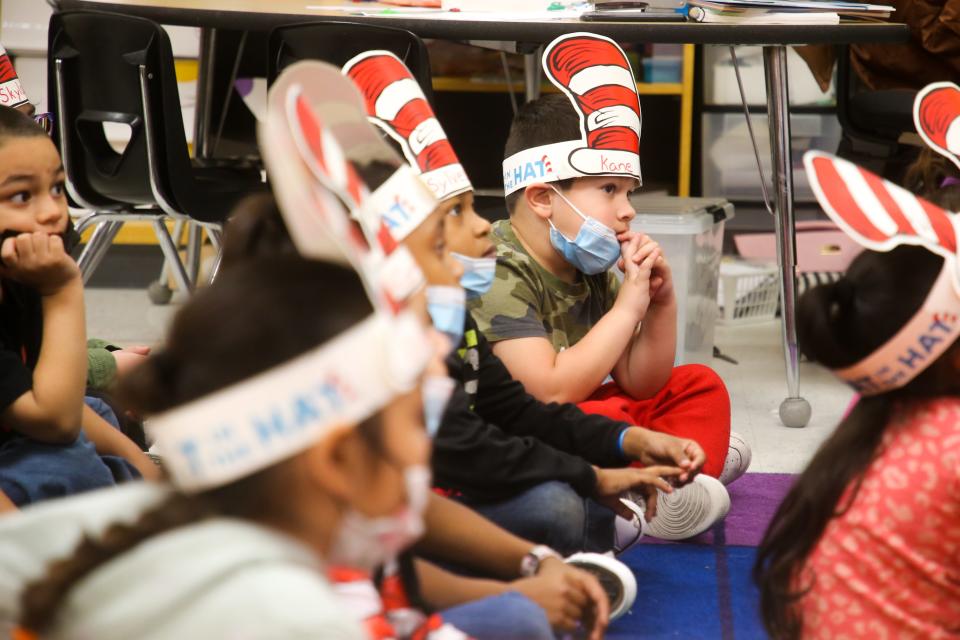Region needs progress on higher education and preschool programs, stakeholders say
There's work to be done in the Coastal Bend to draw students to higher education and to expand early childhood education programs, local stakeholders say.
A committee of representatives from local schools, agencies and businesses met this week to review progress on efforts to build a diverse education to workforce pipeline locally.
Attendees heard about how local goals line up with the state's strategic plan for higher education. They also discussed gaps in the workforce and a local need for early childhood educational programs.
"It frustrates me when I hear kids say, 'I want to get out of Corpus Christi, I want to get out of the Coastal Bend,' because we've got jobs here. Those jobs are in demand and they're good-paying jobs," said Jeffrey West, executive director of the Corpus Christi-based nonprofit Education to Employment Partners. "That's why we're here together. That's why we convened this group."
State and local goals
Texas Higher Education Coordinating Board Deputy Commissioner Ray Martinez spoke during the meeting, explaining that the state intends for 60% of Texans between the age of 26 and 64 to have attained a postsecondary degree or credentials by 2030.
"Many in that age category and that particular bracket are looking to upscale and rescale a new career," Martinez said. "We ought to support higher education institutions like Del Mar (College) and (Texas A&M University-)Corpus Christi to be able to offer programs that cater to that broad range of age demographics."
In Corpus Christi, the city's Education and Workforce Strategic Plan has the same goal and time frame.
Between 2000 and 2015, the state board was focused on increasing access to higher education for underserved student populations, such as racial minorities and low-income or rural students.
Since 2015, the focus has been on retention and success. Only 22.8% of Texans who started eighth grade in 2007 had earned a degree or certificate from a Texas college within six years, according to data compiled by the Texas Tribune from the Texas Higher Education Coordinating Board and the Texas Education Agency.
In Nueces County, that figure was 18.9%, while in the wider Coastal Bend area, or the Texas Education Agency's Education Service Center 2, it was 19.6%.
According to U.S. Census data, the estimated number of individuals age 25 or older who had earned an associate degree or higher was just over 30% in Nueces County in 2020. This percentage has been increasing since 2015, when 27.6% had completed a degree.
The state wants to increase the numbers of Texans who are completing their studies and earning an associate degree, bachelor's degree or workforce education credential, which require less coursework than a full degree but allow a student to earn industry certifications.
"Are they graduating with marketable skills?" Martinez said. "Are they graduating with low student debt? These are things that, if that's not present, will impede their efforts post-college or after their post-secondary credential to get a good-paying job."
After Martinez's presentation, stakeholder committee member Matt Garcia, regional director of community relations for the Texas Oil & Gas Association, said the local stakeholder group has surveyed local employers and is working on a survey for local educators.
The data will be used to advise the city on the creation of a workforce/policy board, to inform events with local businesses and educators and to consider solutions.
Early childhood education
Another goal of the meeting was to discuss the need for more early childhood education programs in Corpus Christi.
Jim Lee, a professor of economics at Texas A&M University-Corpus Christi, presented data exploring the need for a pre-school initiative.
"Based on the raw data, we are serving only 1 in 5 children in the area," Lee said.

Lee added that pay for early childhood teachers is low and that some employees who left the field during the pandemic have not returned.
"Right now, we just don't have the labor, the manpower, the workforce to adequately serve our kids," Lee said.
Sherry Peterson, director of the Success by 6 education program of United Way of the Coastal Bend, said a group of stakeholders is looking at ways that Pre-K 4 SA, a San Antonio pre-school initiative, could be replicated in Corpus Christi.
"We need a strong foundation to get this started," Peterson said. "We need all the partners working together so that it's a collaborative effort."
Peterson said the visit reiterated the importance of strong community support, well-educated and well-compensated teachers and effective curriculum.
"Our community right now is in the process of reviewing those blueprints so that we can develop our own blueprint," Peterson said.
Olivia Garrett reports on education and community news in South Texas. Contact her at olivia.garrett@caller.com. You can support local journalism with a subscription to the Caller-Times.
More: Families desperate for child care, but providers face a 'roller coaster' trying to survive
More: Del Mar College gets $50,000 grant from Coastal Bend Community Foundation to help students
More: First round of cadets completes expedited EMS training at Del Mar College
This article originally appeared on Corpus Christi Caller Times: Stakeholders: Region needs progress on higher education, preschool

